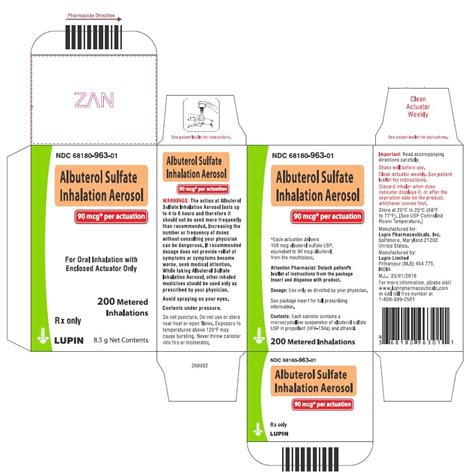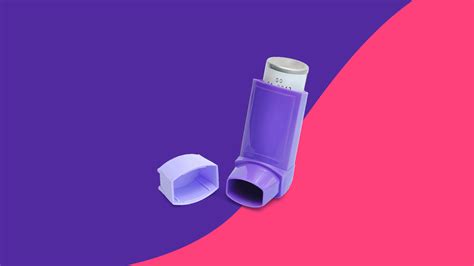Intro
Discover Albuterol Inhaler side effects, including bronchospasm, tremors, and palpitations. Learn about common respiratory issues, inhaler usage, and asthma management to minimize risks and ensure safe treatment with this medication.
The albuterol inhaler is a commonly prescribed medication for individuals suffering from asthma and chronic obstructive pulmonary disease (COPD). It belongs to a class of medications known as bronchodilators, which work by relaxing the muscles in the airways, making it easier to breathe. While the albuterol inhaler is an effective treatment option, it can cause several side effects, some of which can be severe. Understanding the potential side effects of the albuterol inhaler is essential for individuals who use this medication to manage their respiratory conditions.
Asthma and COPD are chronic respiratory diseases that can significantly impact an individual's quality of life. The albuterol inhaler is a quick-relief medication, meaning it provides fast relief from acute asthma symptoms, such as wheezing, coughing, and shortness of breath. However, it is not a controller medication, and it should not be used as a substitute for long-term control medications. The albuterol inhaler is available in various forms, including metered-dose inhalers (MDIs) and dry powder inhalers (DPIs).
The importance of understanding the side effects of the albuterol inhaler cannot be overstated. While the medication is generally well-tolerated, it can cause a range of side effects, from mild to severe. Some individuals may experience side effects after using the albuterol inhaler for the first time, while others may develop side effects after long-term use. It is essential to be aware of the potential side effects of the albuterol inhaler to ensure safe and effective use.
Common Side Effects of Albuterol Inhaler

The most common side effects of the albuterol inhaler include tremors, nervousness, and anxiety. These side effects are usually mild and temporary, resolving on their own within a few hours of using the medication. Other common side effects of the albuterol inhaler include headaches, dizziness, and nausea. In some cases, individuals may experience more severe side effects, such as rapid heartbeat, high blood pressure, and insomnia.
Less Common Side Effects
Less common side effects of the albuterol inhaler include allergic reactions, such as hives, itching, and swelling of the face, lips, and tongue. In rare cases, individuals may experience a severe allergic reaction, known as anaphylaxis, which requires immediate medical attention. Other less common side effects of the albuterol inhaler include changes in taste, dry mouth, and stomach upset.Severe Side Effects of Albuterol Inhaler

Severe side effects of the albuterol inhaler are rare but can be life-threatening. One of the most severe side effects of the albuterol inhaler is a condition known as paradoxical bronchospasm, which causes the airways to constrict, making it difficult to breathe. Other severe side effects of the albuterol inhaler include cardiac arrhythmias, such as atrial fibrillation and ventricular tachycardia, and hypokalemia, a condition characterized by low potassium levels in the blood.
Cardiovascular Side Effects
Cardiovascular side effects of the albuterol inhaler are a concern, particularly in individuals with pre-existing heart conditions. The medication can cause an increase in heart rate and blood pressure, which can lead to more severe cardiovascular problems, such as heart attacks and strokes. Individuals with a history of heart disease, high blood pressure, or cardiac arrhythmias should use the albuterol inhaler with caution and under the close supervision of their healthcare provider.Interactions with Other Medications

The albuterol inhaler can interact with other medications, including beta blockers, diuretics, and certain antidepressants. These interactions can increase the risk of side effects or reduce the effectiveness of the medication. Individuals who take other medications should inform their healthcare provider before using the albuterol inhaler. It is essential to use the medication only as directed and to follow the recommended dosage to minimize the risk of interactions.
Precautions and Warnings
Precautions and warnings are essential when using the albuterol inhaler. Individuals with a history of heart disease, high blood pressure, or cardiac arrhythmias should use the medication with caution. Pregnant or breastfeeding women should also use the albuterol inhaler with caution, as the medication can pass into breast milk and affect the baby. Additionally, individuals with a history of seizures, thyroid disease, or diabetes should use the medication under the close supervision of their healthcare provider.Overuse and Misuse of Albuterol Inhaler

Overuse and misuse of the albuterol inhaler can lead to severe side effects and reduce the effectiveness of the medication. Individuals who use the albuterol inhaler more frequently than recommended or at higher doses than prescribed can experience rebound bronchospasm, a condition characterized by worsening asthma symptoms. Additionally, overuse of the albuterol inhaler can lead to dependence on the medication, making it more challenging to manage asthma symptoms.
Proper Use and Storage
Proper use and storage of the albuterol inhaler are essential to ensure safe and effective use. Individuals should use the medication only as directed and follow the recommended dosage. The albuterol inhaler should be stored in a cool, dry place, away from direct sunlight and moisture. Additionally, individuals should clean and maintain the inhaler regularly to prevent clogging and ensure proper functioning.Alternatives to Albuterol Inhaler

Alternatives to the albuterol inhaler are available for individuals who experience severe side effects or prefer not to use the medication. Other bronchodilators, such as levalbuterol and pirbuterol, can provide similar relief from asthma symptoms. Additionally, combination medications that contain a bronchodilator and an inhaled corticosteroid can provide long-term control and quick relief from asthma symptoms.
Corticosteroids and Other Medications
Corticosteroids and other medications can be used in conjunction with the albuterol inhaler to manage asthma symptoms. Inhaled corticosteroids, such as fluticasone and budesonide, can provide long-term control and reduce inflammation in the airways. Other medications, such as mast cell stabilizers and leukotriene modifiers, can also be used to manage asthma symptoms and reduce the need for the albuterol inhaler.Conclusion and Next Steps

In conclusion, the albuterol inhaler is a commonly prescribed medication for individuals suffering from asthma and COPD. While the medication is generally well-tolerated, it can cause several side effects, some of which can be severe. Understanding the potential side effects of the albuterol inhaler is essential for individuals who use this medication to manage their respiratory conditions. By following the recommended dosage, using the medication only as directed, and being aware of the potential side effects, individuals can ensure safe and effective use of the albuterol inhaler.
We invite you to share your thoughts and experiences with the albuterol inhaler in the comments section below. Have you experienced any side effects while using the medication? How do you manage your asthma symptoms? Your feedback and insights can help others who are struggling with respiratory conditions. Additionally, if you have any questions or concerns about the albuterol inhaler or asthma management, please do not hesitate to ask.
What are the most common side effects of the albuterol inhaler?
+The most common side effects of the albuterol inhaler include tremors, nervousness, and anxiety. Other common side effects include headaches, dizziness, and nausea.
Can I use the albuterol inhaler if I have a history of heart disease?
+Individuals with a history of heart disease should use the albuterol inhaler with caution and under the close supervision of their healthcare provider. The medication can cause an increase in heart rate and blood pressure, which can lead to more severe cardiovascular problems.
How do I properly store and maintain the albuterol inhaler?
+The albuterol inhaler should be stored in a cool, dry place, away from direct sunlight and moisture. Additionally, individuals should clean and maintain the inhaler regularly to prevent clogging and ensure proper functioning.
